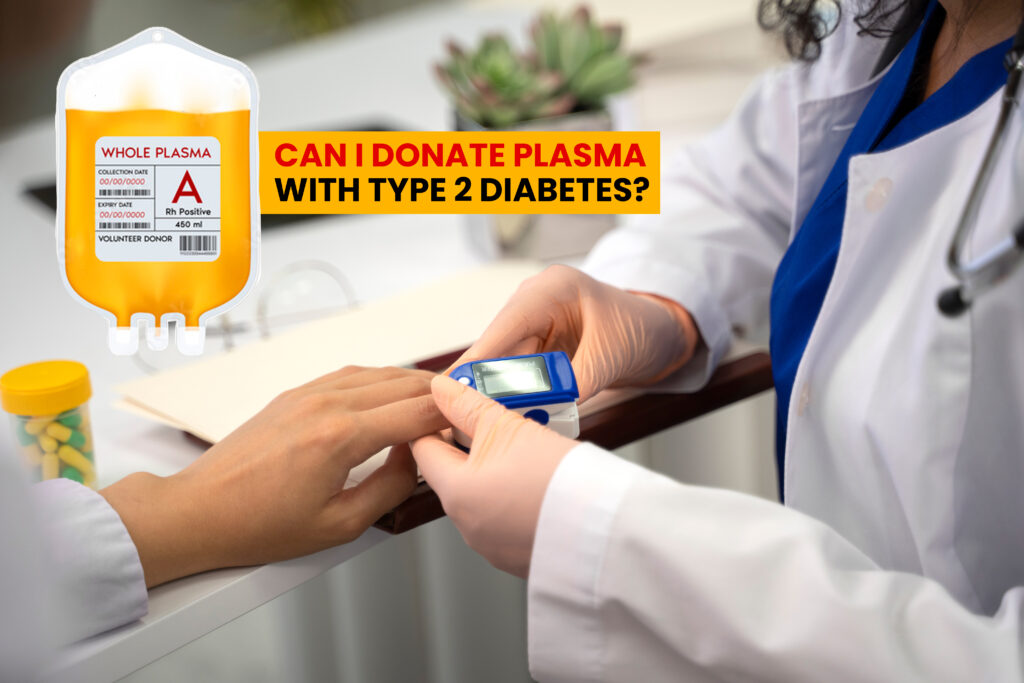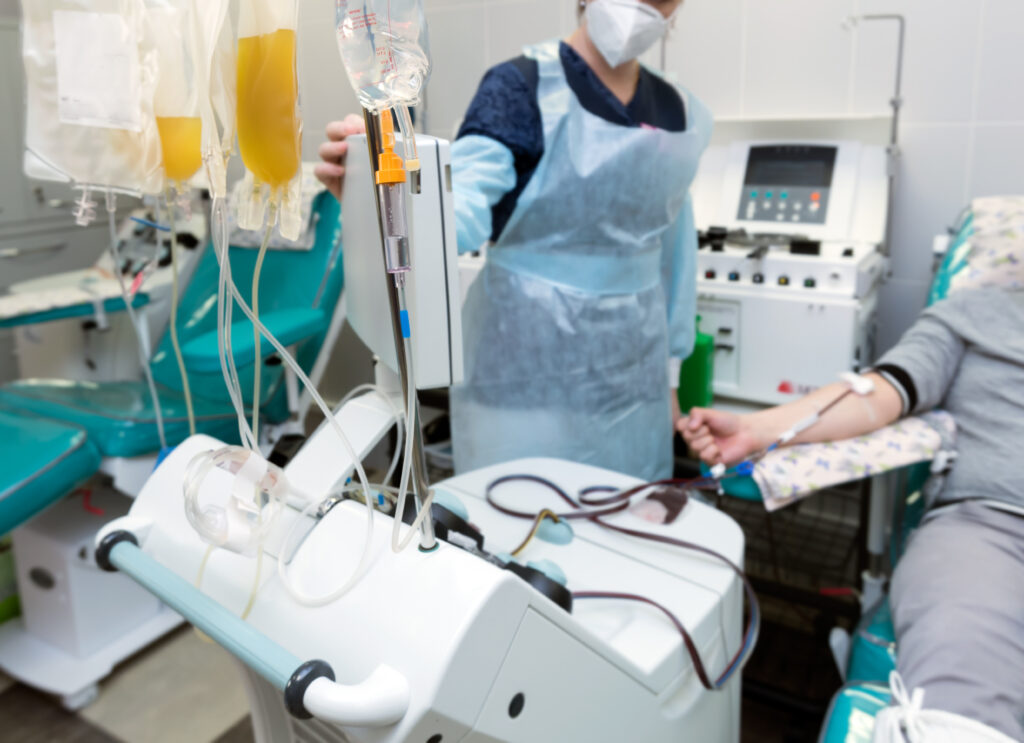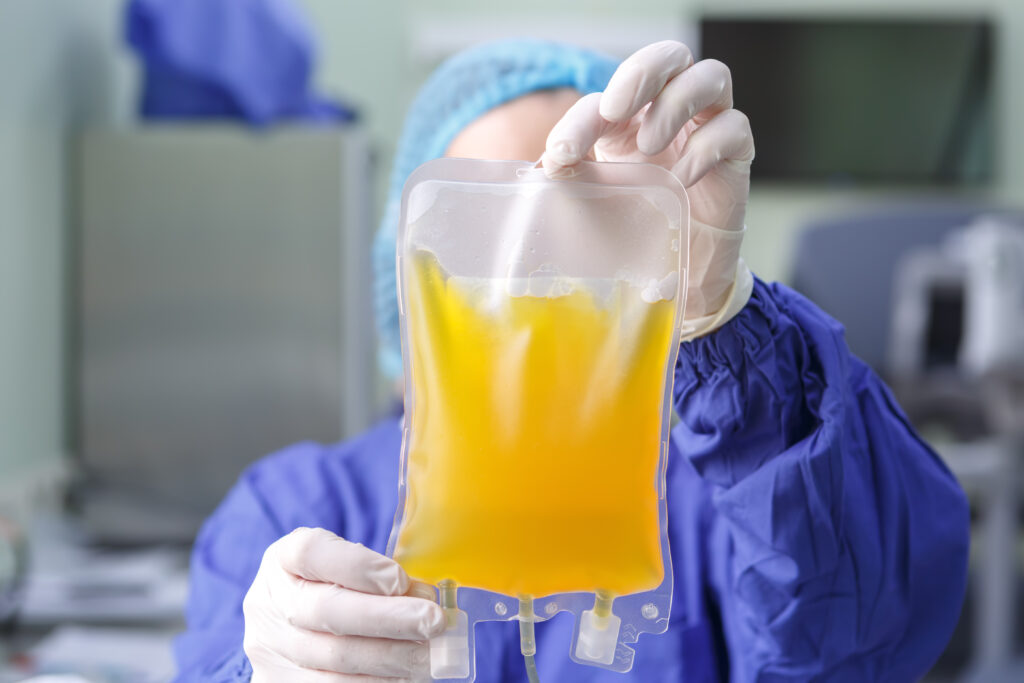
To campaign a noble cause such as plasma donation that can be used to save lives, is highly commendable. But then living with type 2 diabetes, someone may ask, “Can I donate plasma if I have type 2 diabetes?” The answer is yes; you are allowed to donate plasma if you are living with type 2 diabetes. Although there are certain specific exclusion criteria for plasma donation which have been put in place by WHO and the American Red Cross that people with well-controlled type 2 diabetes can donate plasma. This blog post will discuss the factors, possible drawbacks, and effects of type 2 diabetes on plasma donation; in turn, helping you grasp the concept.
What is Type 2 Diabetes?
Before finding answers to the question – can I donate plasma if I have type 2 diabetes, let us first understand what is Type 2 Diabetes.
Type 2 Diabetes is a long-term illness with your body being unable to properly regulate glucose, which is a type of sugar that provides energy to your body. This form of diabetes is most common and occurs when your body is unable to use insulin properly or your pancreas does not produce enough of this hormone to help transport glucose into your cells.
Prevalence and Symptoms
Type 2 diabetes is then a serious issue affecting millions of people in the United States, where, the American Diabetes Association reports, more than 34 million population has diabetes and 90 to 95 % are with type 2 diabetes. Some of the common characteristics of people with type 2 diabetes are:
- increased thirst,
- increased occurrences of urination,
- unexplained weight loss,
- constant lethargy, and
- vision problems such as blurring of vision.
Any of the above symptoms need attention of a doctor to get an accurate diagnosis and work on the right course of action.
Managing Type 2 Diabetes
Regarding type 2 diabetes management, the most common interventions include dietary modifications, physical activity, and weight loss. Others may also need to take other drugs or insulin shots to keep their blood sugar in check. Self-management and knowledge about the condition or disease is crucial in the case of donation of plasma. All this requires collaboration with a qualified health care provider to handle the procedure.
Eligibility Criteria for Plasma Donation
The chief focus of Plasma donation centers is on the generality of the donor’s health and the management of diabetes. Here are some key points to consider:
Health Stability: Your diabetes is not under control. This implies that the subjects’ blood sugar levels should be at normal levels for extended lengths of time.
Medication: When on medication such as insulin your diabetic status should remain well controlled.
Lifestyle Practices: Therefore, one has to eat a balanced diet and exercise, and these are key factors that dictate eligibility.
The necessary tests before the donation process include a medical check-up, medical history evaluation, and certain regular tests. This is helps to find out the compatibility between the donor and the recipient so that neither of them gets any harm in the process. However, special guidance concerning diabetic donors is better clarified with the local donation center.

Potential Risks of Plasma Donation with Diabetes
While donating plasma is generally safe, there are potential risks for individuals with type 2 diabetes:
Risk of Hypoglycemia
The procedure of plasma donation means that first, the blood is taken away, secondly, the plasma is collected, and, at last, the remaining part is returned to the human body. This procedure occasionally interferes with the blood sugar levels and results in low blood sugar commonly referred to as hypoglycemia.
Medication Interactions
Some of the Drugs taken by diabetic patients negatively affect Plasma donation. Before proceeding with donating, it is relevant to talk to the staff at the donation center about the medications you take to avoid any incompatibility.
Physical Side Effects
There can be physical complications that result from plasma donation, so some individuals may feel weak or fatigued afterward. These symptoms affect diabetic care mainly if you are physically active, and therefore can impair your ability to exercise.
Blood Sugar Fluctuations
There is an extension of pressure on one’s body during the donation process, and this definitely affects the blood sugar level. This must do a lot for persons who normally have problems regulating their blood glucose levels during normalcy.

How Type 2 Diabetes Affects Plasma Quality?
Due to the formation of glycated proteins, the quality of plasma can be affected by type 2 diabetes. These are proteins that become glycated due to the steady high blood sugar levels prevalent within the human body, especially within a diabetic patient. Glycated proteins can:
Interfere with Normal Protein Function: This has an impact on the efficiency of the donated plasma.
Increase Risk of Oxidative Damage: Glycated proteins are equally vulnerable to oxidative stress than non-glycated proteins as they weaken protein structure and function.
Trigger Inflammatory Responses: This can prove detrimental, especially to the efficacy of the donated plasma.
The presence of these conditions may not immediately invalidate a person’s plasma donation if they already have type 2 diabetes but it still underscores the need for pre-screening and an evaluation on a case-by-case basis.
Do People with Type 2 Diabetes Qualify to Donate Their Plasma?
Thus, it could be stated that depending on your current health state, actual blood glucose levels, and the regulations of the plasma donation center you are visiting, the answer to “Can I donate plasma if I have type 2 diabetes?” would be either yes or no. In general, if a person’s diabetes is well controlled, there is no reason she or he cannot give plasma. However, it is highly recommended to discuss it with your healthcare provider as well as with organizations that deal with plasma donation.
At Direct Preventive Care, we address how to solve health complexities by energizing the body through preventive measures. Only clinical experts offer a thorough assessment of the actual causes of diabetes and other hormone-related ailments. We access and analyze both symptoms and root causes. We provide modern health care facilities with proven results, we assure you a healthier life. For more details and consultation, contact us today.














